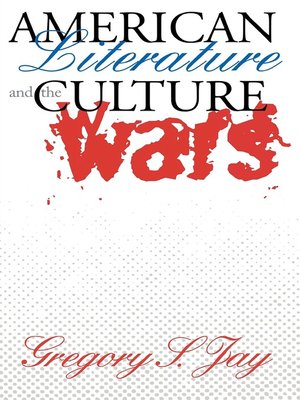
Sign up to save your library
With an OverDrive account, you can save your favorite libraries for at-a-glance information about availability. Find out more about OverDrive accounts.
Find this title in Libby, the library reading app by OverDrive.



Search for a digital library with this title
Title found at these libraries:
| Loading... |
Gregory S. Jay boldly challenges the future of American literary studies. Why pursue the study and teaching of a distinctly American literature? What is the appropriate purpose and scope of such pursuits? Is the notion of a traditional canon of great books out of date? Where does American literature leave off and Mexican or Caribbean or Canadian or postcolonial literature begin? Are today's campus conflicts fueled more by economics or ideology? Jay addresses these questions and others relating to American literary studies to explain why this once arcane academic discipline found itself so often in the news during the culture wars of the 1990s. While asking some skeptical questions about new directions and practices, Jay argues forcefully in favor of opening the borders of American literary and cultural analysis. He relates the struggle for representation in literary theory to a larger cultural clash over the meaning and justice of representation, then shows how this struggle might expand both the contents and the teaching of American literature. In an account of the vexed legacy of the Declaration of Independence, he provides a historical context for the current quarrels over literature and politics. Prominent among these debates are those over multiculturalism, which Jay takes up in an essay on the impasses of identity politics. In closing, he considers how the field of comparative American cultural studies might be constructed.
|Gregory S. Jay boldly challenges the future of American literary studies. Why pursue the study and teaching of a distinctly American literature? What is the appropriate purpose and scope of such pursuits? Is the notion of a traditional canon of great books out of date? Where does American literature leave off and Mexican or Caribbean or Canadian or postcolonial literature begin? Are today's campus conflicts fueled more by economics or ideology? Jay addresses these questions and others relating to American literary studies to explain why this once arcane academic discipline found itself so often in the news during the culture wars of the 1990s.
While asking some skeptical questions about new directions and practices, Jay argues forcefully in favor of opening the borders of American literary and cultural analysis. He relates the struggle for representation in literary theory to a larger cultural clash over the meaning and justice of representation, then shows how this struggle might expand both the contents and the teaching of American literature. In an account of the vexed legacy of the Declaration of Independence, he provides a historical context for the current quarrels over literature and politics. Prominent among these debates are those over multiculturalism, which Jay takes up in an essay on the impasses of identity politics. In closing, he considers how the field of comparative American cultural studies might be constructed.






